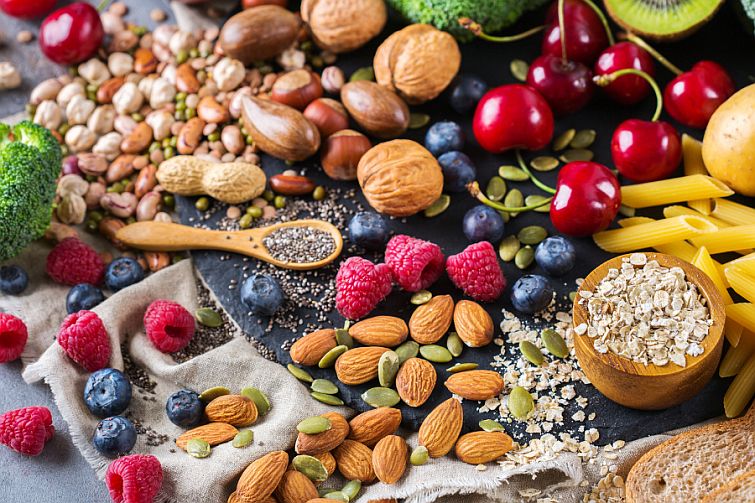Share This Article
Food has a very significant role to play in any sustainability strategy and encompasses a broad array of environmental and social issues. The choices made impact on climate change, human health and animal welfare. Not surprising then that lowering your food footprint is one of the themes of this year’s Earth Day campaign.
Food waste in hotels is part of the problem as we naturally associate eating good food – and plenty of it – with vacations and traveling. However, there are countless ways that hoteliers can adopt more sustainable food and beverage policies which will reduce food waste and offer guests the experience they expect.
The reality of food waste
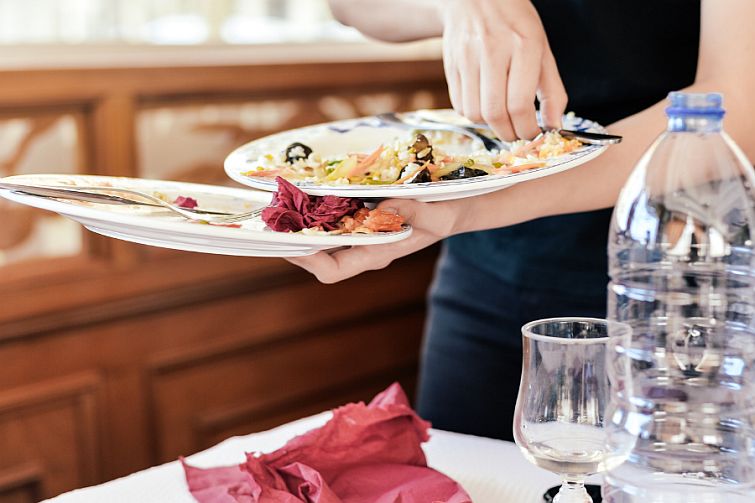
It is a modern paradox that, on the one hand, there are people who have such an abundance of food that they have leftovers to waste. And, on the other hand, there are 690 million people who do not have enough to eat. There is actually enough food to feed the global population if we cut down on food waste. Ironically, small farmers, herders, and fishermen who produce about 70 percent of the global food supply, are particularly at risk. An estimated 14 million children under the age of five worldwide suffer from severe acute malnutrition. (source: https://www.actionagainsthunger.org/world-hunger-facts-statistics )
Another interesting insight is that an astonishing amount of food is wasted before it even reaches the plate. Here are some interesting statistics from the UN Food and Agriculture Organization (FAO) showing that 53% of food is lost or wasted before it even reaches the plate. That is nearly 3 trillion pounds of food per year, enough to feed an estimated 2 billion people.
- 20% of food is lost in picking and sorting
- 3% in storage and shipping
- 2% in production
- 9% at supermarkets
- 19% uneaten and discarded at home
The U.S. alone spends $218 billion annually processing food that is never eaten and ⅓ of the food produced globally is wasted. (sources: Move For Hunger and UC Davis)
Reducing food waste is not only good for the environment because it reduces the need for diesel powered waste hauling trucks, resource consumption, and greenhouse gases in landfills, but also because it can save the hotel money.
Do hotels even know how much food they are wasting?
How to undertake an audit for food waste in hotels

The easiest way to do an audit is to collect all the waste from one restaurant for example, over a given time frame – perhaps a month but the longer the better. Each waste bag is labelled according to where in the restaurant it came from as well as the day. With this information, the hotel can get an idea of not only how much food is wasted, but the specific areas of the restaurant it comes from. With this information, the hotel can get an idea of not only how much food is wasted, but the specific areas it comes from, as well as days that may be more of an issue than others (for example, weekends may produce more waste than week days), and food items that are wasted more than others.
Each hotel would then create a unique plan to reduce this waste. They may, for example, find that 80% of their pasta dishes are never finished, and therefore decide to reduce the plate size, or offer a smaller option. Menus should be reviewed as well. Items that are unnecessary, ordered rarely, travel too far to arrive at the table or are unethically farmed or obtained should be edited.
In addition, hotels are sharing leftover food with staff – treating them to pastry and appetizers prepared for large functions as well as rethinking banquet menus to reduce decoration and quantities to reduce waste.
There are also inventive programmes opening up across the world where hospitality establishments can donate non-perishable food as well as fresh food which is within its sell-by date. This could be shared with food banks and local charities. There are even restaurants in Europe who are only using food that is past its ‘best before’ but not ‘use by’ date and creating wonderful dishes. This is often from food donated by supermarkets where food waste has been a big problem.
There will likely still be some food waste created, due to food preparation and left behind by guests. In this case, as much of the remaining waste should be composted as possible.
Make food choices from sustainable agriculture
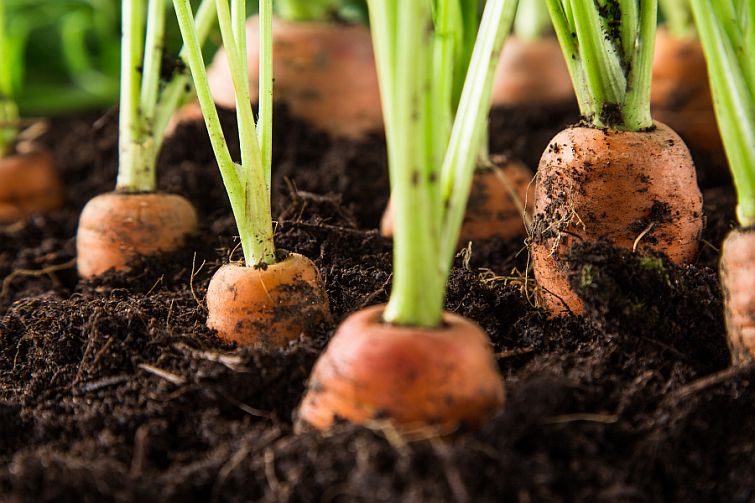
We know that modern agriculture is having both environmental and social impacts:
- Pesticides are having detrimental effects on wildlife, particularly pollinators, and polluting waterways due to run-off
- Pesticides and synthetic fertilizers also cause human health problems
- Small farmers are beholden to large chemical companies for the purchase of chemicals and seeds
- Monocultures and intensive farming methods are degrading our soil
One of the main reasons for intensive farming has always been that this is the only way to feed a growing global population. However, a new study from France, Ten Years for Agroecology (TFYA), has shown that Europe could actually produce enough healthy food for its estimated 530 million inhabitants by 2050.
The new approach which could be adopted according to the findings of the study would involve the following:
- Phasing out of pesticides and synthetic fertilizers
- Redeployment of grasslands and landscape infrastructure
- Reduced production of animal products
This approach would achieve the healthy feeding of Europeans with excess for export; reduce Europe’s global food footprint; reduce greenhouse gas emissions within the European agricultural sector by 40%; regenerate biodiversity and conserve natural resources.
The full report can be downloaded here
Healthy food choices for guests
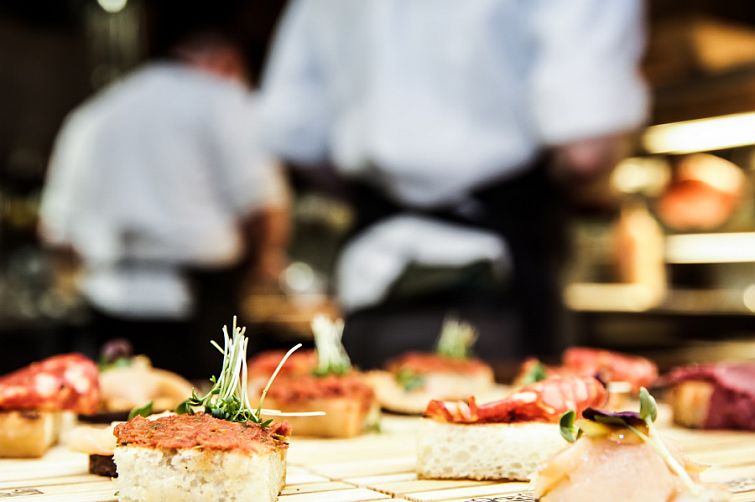
Consumers are becoming more aware that the food choices they make have an impact on the environment as well as their own health. This is clearly illustrated in the interest in plant-based eating and the continued rise in veganism.
Another factor is that we have seen how conditions such as diabetes and obesity have played a significant role in Covid-19 risk and outcomes. Plant-based diets are able to help in reducing these types of conditions as well as heart conditions and overall well-being. They are better for human health as well as the health of our soil. Fruits, vegetables, wholegrains and pulses can be cultivated sustainably by working in harmony with nature rather than against it.
When people travel, they do want to treat themselves but they also do not want to compromise on their chosen diet. So for any hotel there is a huge opportunity to offer more plant-based options. Hotel restaurants can offer creative and unusual dishes which their guests may not have time to do at home, using local ingredients which may be unknown by the guest. Fruits and vegetables always provide color to any dish and they can become the leading star ingredients rather than taking second-place to meat or fish! The addition of fresh herbs and spices can create a depth of flavour and aroma.
Sustainable supply chains reduce carbon emissions
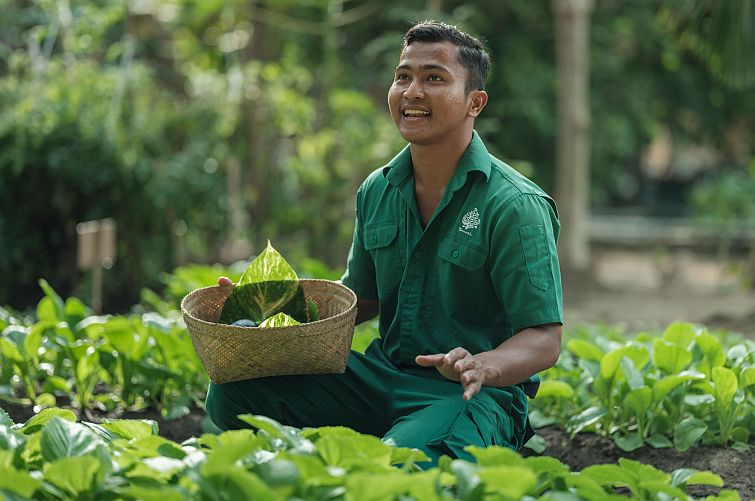
Another factor in sustainable food is how and where ingredients are sourced. When people travel, they are usually interested in experiencing different cultures. An important part of this is trying different foods and flavors. Where possible, it will always be best of offer locally grown and reared produce and guests can be encouraged to try local specialities.
This approach also helps to contribute to the local community rather than importing food from overseas. This may mean a change in attitudes and some foods may not currently be available locally. However, this offers hoteliers the chance to engage with the community and work with a local farmer to become a supplier of a particular vegetable for example.
Even better is for a hotel to consider creating its own organic kitchen garden (as many Wayaj hotel members do) and growing their own fruit and vegetables for a true farm to fork experience.
This approach covers wines and beverages too. The cocktails on offer may contain local indigenous fruits. The wines on offer could be made from grapes produced by local vineyards or spirits from local ingredients.
Staff should be involved
The success of any sustainability strategy depends greatly on engagement with staff. As mentioned, excess food can be shared with them. But more than that, they can be involved in highlighting sustainable options on menus, explaining about different portion sizes available.
They can tell guests about the provenance of the foods on their menus and even show them round their own organic kitchen garden. Many hotels offer cooking classes which allow guests to pick vegetables themselves and cook up something really special!
Everyone loves food and this is something that staff can get excited about too!
Sources:

